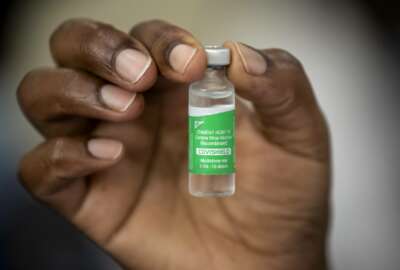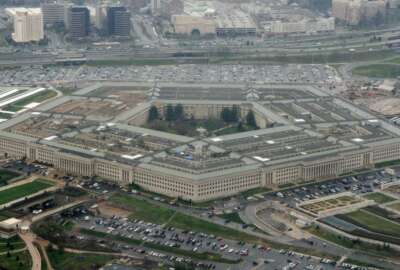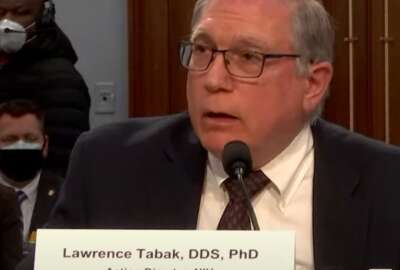
This federal doctor’s research has made HIV/AIDS manageable and saved lives
Clifford Lane is the clinical director for the National Institute of Allergy and Infectious Diseases and a Service to America Medal finalist
Best listening experience is on Chrome, Firefox or Safari. Subscribe to Federal Drive’s daily audio interviews on Apple Podcasts or PodcastOne.
Fourty years ago, HIV/AIDS was a fearsome scourge. Today it’s manageable, and many people with it can lead normal lives. Much of the life saving research into the virus and the disease has been conducted by our next guest in his 40 years at the National Institutes of Health. He’s the clinical director for the National Institute of Allergy and Infectious Diseases, and a finalist in this year’s Service to America Medals program. Clifford Lane joined the Federal Drive with Tom Temin.
Interview transcript:
Tom Temin: And you have done according to the citation, more than 30 clinical trials over the years to try to get to some way of getting this under control. And those of us old enough to remember when it was really the most talked about public health issue of the day, you know, during the Reagan years and so forth. Tell us about what you did, what these trials were all about and how you got this whole network established.
Clifford Lane: So you’re right. I mean, it’s hard to imagine today what HIV/AIDS was like in the early 1980s, where patients would come in, they would have a variety of opportunistic infections or cancers. And despite our ability to treat some of those infections or cancers, we couldn’t do anything to the underlying immune defect, which was then discovered to be due to the virus that we call HIV. So what we had done at the NIH was early on, we were bringing patients here who had what’s now called AIDS. And we were trying all different types of therapies trying to stimulate their immune system, trying to use antivirals, even before we knew what the virus was. And then eventually, the first drug proven to be effective, AZT was identified by collaborations between Sam Broder, the cancer institute, and Burroughs Wellcome was the company at the time, it’s GSK today, and that was the first step. And from there looking at other single agents, combination agents, eventually finding ways that combinations of antiviral drugs would well, suppress the virus, allow the immune system to recover, then moving on to studies to try to figure out the best way to do those potent drugs such that from the time of diagnosis, patients should be on continuous therapy. And with that life expectancies approach normal for patients with AIDS.
Tom Temin: Right. And not only life expectancy, but quality of life is generally pretty good for those people. Correct?
Clifford Lane: It has made a major change in the lives of patients with AIDS. Yes.
Tom Temin: And let me ask you this, because in the current pandemic, a lot of the focus has been on the virus itself. And very early on when the Coronavirus broke out here, there were pictures of it, you know, it looked like a little ball with sticks coming out all over and this kind of thing. And so the national effort was to get a vaccine. It seems like in the case of the AIDS virus, which I imagine is a totally different family of virus, the concentration was on mitigating the effects of the virus because why? The virus could not be dealt with in a vaccine manner the way the current virus can?
Clifford Lane: It’s an interesting question, interesting perception. Because I mean, actually, if you look at those two viruses and the way it’s been approached, there has been an aggressive vaccine effort in HIV since the virus was discovered, and an aggressive therapeutic effort. In terms of COVID-19 and SARS-CoV-2, actually also a very aggressive treatment and vaccine effort. We’ve just been more successful in treatments when it comes to AIDS overall, and much less successful in vaccines compared to COVID-19, where we’ve been really successful in vaccines. And while we can prevent patients early on from getting real sick, we still don’t have great therapies for COVID-19 for those patients who are severely ill.
Tom Temin: Right? So is there still an ongoing effort even in this latter day to see if ever a vaccine can be developed for the AIDS virus?
Clifford Lane: There absolutely is a very robust vaccine effort both by the public sector, the NIH and by private industry. It’s just a real challenge because of the way the virus is able to constantly change, you know, just like COVID-19, there are changes. But the HIV virus seems to have an ability to change much more rapidly. And in essence to evade the immune system, a good immune response we know can block COVID-19, give you more rapid recovery. We have very few people who make that type of good immune response to HIV.
Tom Temin: Interesting, we’re speaking with Dr. Clifford Lane. He is clinical director of the National Institute of Allergy and Infectious Diseases and a finalist in this year’s Service to America Medals program. And throughout this 40 year period of running these trials, was that the main focus of your work because there’s a lot of infectious diseases, and you are the clinical director, but sounds like this was central in your career.
Clifford Lane: Certainly at the time I came to NIH, it was at the beginning of the AIDS epidemic. So that was where the focus was and, and again, what we do is we take the clinical trials as ways to better our understanding of the pathogenesis of the illness. So a lot of the work that we do has been studying the nature of the immune defect on patients with HIV in ways that we might even approach that immune defect, independent of attacking the virus. As you say, we are the infectious diseases, the allergy immunology Institute. And from time to time, there have been a few other challenges that have come our way, the most recent ones being Ebola. And then COVID-19, as you said.
Tom Temin: Right. And these clinical trials, just from a functional standpoint, were these generally conducted within the confines of NIH, which does have some trials running natively, or are these contracted out to hospitals and health networks throughout the country?
Clifford Lane: It’s a combination, some of the studies were done here, just within the clinical center of the NIH in Bethesda. And some of them have been done in collaboration with outside networks. One of the collaborators I have for a lot of this work is professor Jim Neaten, at the University of Minnesota. That’s a global network called Insight that did studies looking at timing, and whether or not intermittent versus continuous therapy is needed. So these are large global networks, HIV is a global problem, we feel it important to have a global research network, but then we engage and have good collaborations between the federal workers as well as the funded external collaborators.
Tom Temin: And if you look at the HIV/AIDS episode, long episode as kind of a social and medical and political event in the nation’s history, and many people were involved in many aspects of this throughout the country throughout the world, really. In the latter day, now, is there a kind of body of people that still stay in touch, still collaborate? It seems like there’s a society of people that worked on this, do you feel like you’re part of something like that?
Clifford Lane: I think those of us who have been involved in this, since the early days, you know, feel that we’ve gone through quite a considerable set of experiences. I won’t say a battle, but at times it has felt like a battle. And while we haven’t seen each other other than through zoom, for the last couple of years, I think we typically do have the chance to get together during annual meetings, whether they’re domestically or internationally and do stay in touch. And there is quite a bond, I think, between the groups that work on this disease and have worked on it.
Tom Temin: And preventing the spread of the virus that was also a major public education effort and resulted in I think, a lot of social changes, a lot of mores changes. And that must be something that you look proudly on to because it did change behaviors on a mass scale.
Clifford Lane:
You know, it’s interesting, when you look, I think, at the history of the response to AIDS, is that there are a variety of things that happened that have been carried forward into other areas of research, certainly for us in infectious diseases. I think a very important part of it was the way that community that was most affected first felt a bit on the outside. And then I think now feel much more, I hope feel much more as partners with us in developing and carrying out the research agenda and identify what are the key questions at the moment that we should be addressing.Tom Temin: And you are several years a number of years past, what would be standard annuitants age for federal employees, what keeps you going?
Clifford Lane: I just love the work here, I think the mission of the NIH, you know, fundamental and applied research to improve the health of the nation and by extension the world. I think that’s a really good mission, we have the opportunity to do things that are just on a daily basis, very rewarding.
Tom Temin: What else are you working on at this point? As director, sometimes it’s a little more hands off, and perhaps you know, that you made your bones on?
Clifford Lane: Well as clinical director, you do have oversight for a large portfolio, but to me to be able to provide effective oversight. It’s important to be active as well and to be a player as well as a director. So, again, you know, we continue to work in HIV/AIDS, we actually have been very involved in obviously the COVID-19 response. My own area has been therapeutics and hospitalized patients. And then obviously, most recently, we’re getting involved in some monkeypox, we’re have a study getting ready to start in the Democratic Republic of the Congo, I’m hoping within the next month or two.
Tom Temin: All right, well, we’re glad you’re on the job. Dr. Clifford Lane is clinical director of the National Institute of Allergy and Infectious Diseases, and a finalist in this year’s Service to America Medals program.
Copyright © 2024 Federal News Network. All rights reserved. This website is not intended for users located within the European Economic Area.
Tom Temin is host of the Federal Drive and has been providing insight on federal technology and management issues for more than 30 years.
Follow @tteminWFED
Related Stories





